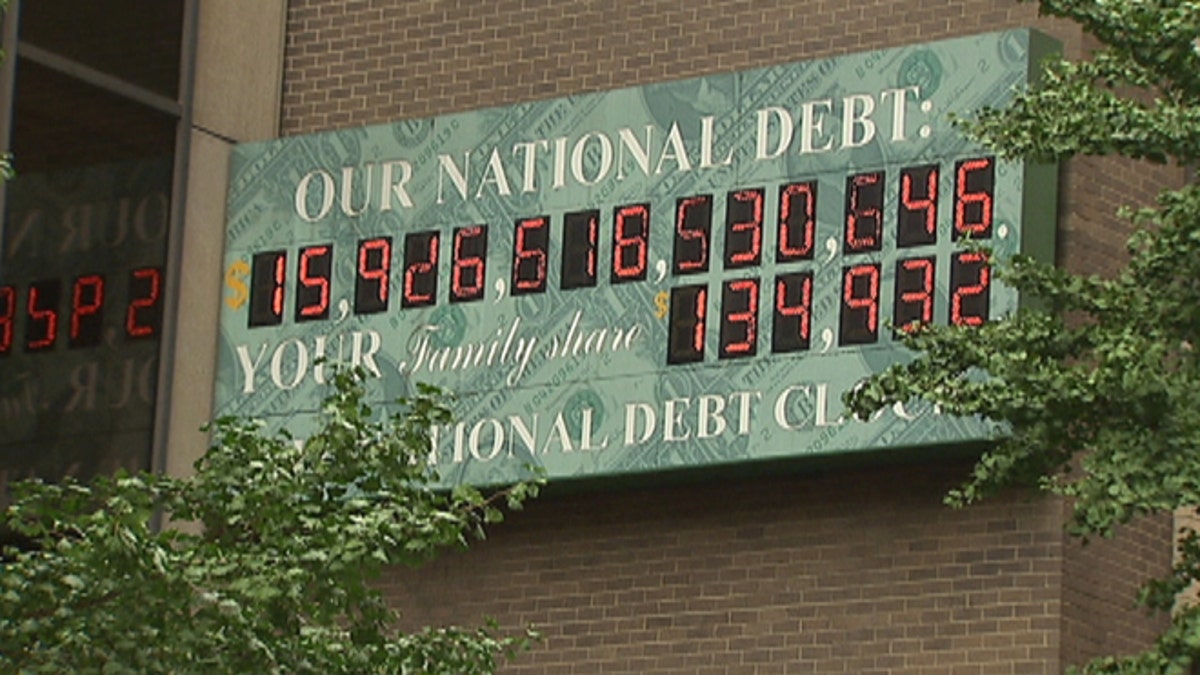
Aug. 17, 2012: The National Debt Clock in Midtown Manhattan shows the federal debt approaching $16 trillion. (Fox News)
America's credit rating is once again at risk.
Moody's Investors Service said Tuesday that it would probably cut its triple-A rating on U.S. government debt by a notch unless congressional leaders can strike a budget deal in the coming months to bring down the deficit.
"If those negotiations lead to specific policies that produce a stabilization and then downward trend in the ratio of federal debt to GDP over the medium term, the rating will likely be affirmed," Moody's said in a press release Tuesday. "If those negotiations fail to produce such policies, however, Moody's would expect to lower the rating, probably to Aa1."
The threat comes after one of the other big three ratings firms, Standard & Poor's, downgraded the U.S. last year following the brawl in Washington over the debt ceiling.
The country is once again headed for a debt-ceiling showdown, with Moody's predicting the country will run up against the ceiling "around the end of this year." Any potential downgrade is not likely until at least next year.
House Speaker John Boehner, reacting to the latest warning, called on Congress to take major steps to reform the tax code, cut spending and overhaul entitlements.
"Today's warning by Moody's underscores the point we have been making all year: the threat to American jobs comes not from action on our debt, but from inaction on our debt," he said.
Lawmakers, though, are unlikely to do much until after the November election, when the balance of power in Washington is more clear.
Moody's said the firm will wait for a budget deal -- or the collapse of one -- before determining the U.S. credit rating.
The big wild card in the near-term concerns the so-called "fiscal cliff" -- the slew of tax hikes and spending cuts set to take effect in January 2013 unless Congress averts them.
Ironically, Moody's said one of the few ways the U.S. could maintain its current status, of triple-A with a "negative outlook," would be if Congress actually lets those tax hikes and spending cuts happen.
But even that doesn't guarantee a sterling credit score. Going over the "fiscal cliff" would help close the deficit, but the flip side is it could destabilize the economy. And Moody's said it would need evidence the economy could "rebound" before returning the U.S. rating to triple-A and "stable."
Boehner expressed doubt Tuesday that much of anything could be done to avert the tax hikes and spending cuts -- potentially good news for the budget, but bad news for the economy.
"I'm not confident at all," Boehner said.
The Ohio Republican reminded reporters that the House has passed legislation to both avoid the automatic, across-the-board cuts next year and to renew the Bush era tax rates for one year as well. Republicans warned of the impact of the impending cuts on the military and implored Senate Democrats to act to avoid them.
The Senate, however, has deadlocked over taxes and failed to address the across-the-board cuts, known as a sequester in Washington parlance.
The Associated Press contributed to this report.











































